 W
WAku-Aku: the Secret of Easter Island is a 1957 book by Thor Heyerdahl published in English the following year. The book describes the 1955–1956 Norwegian Archaeological Expedition's investigations of Polynesian history and culture at Easter Island, the Austral Islands of Rapa Iti and Raivavae, and the Marquesas Islands of Nuku Hiva and Hiva Oa. Visits to Pitcairn Island, Mangareva and Tahiti are described as well.
 W
WAll About Radiation is one of the books by L. Ron Hubbard that form the canonical texts of Scientology, although it is no longer promoted by the Church of Scientology nor included in their "Basics" book canon. Its first printing was from HASI by way of the Speedwell Printing Company, Kent, England, 1957. Later editions were published by the Church of Scientology's in-house publisher Bridge Publications.
 W
WAnatomy of Criticism: Four Essays is a book by Canadian literary critic and theorist Northrop Frye that attempts to formulate an overall view of the scope, theory, principles, and techniques of literary criticism derived exclusively from literature. Frye consciously omits all specific and practical criticism, instead offering classically inspired theories of modes, symbols, myths and genres, in what he termed "an interconnected group of suggestions." The literary approach proposed by Frye in Anatomy was highly influential in the decades before deconstructivist criticism and other expressions of postmodernism came to prominence in American academia circa 1980s.
 W
WAutobiography of a Geisha is a book by Sayo Masuda . It was first published in Japan in 1957, and the English translation by G. G. Rowley was published in 2003. Masuda wrote her autobiography between the years of 1956 and 1957 in response to a magazine ad for a non-fiction women's writing competition. Having never learned to read kanji, Masuda wrote the entire book in hiragana, with her editors carefully working to convert her writing into standard kanji in-post whilst preserving the feeling of her original writing.
 W
WBaruch: My Own Story a memoir of Bernard Mannes Baruch, which he put together himself, originally published by Henry Holt in 1957. It has been republished in two volumes by Buccaneer Books in 1993.
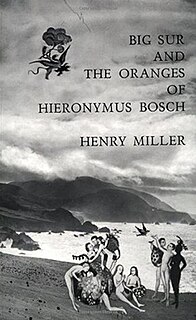 W
WBig Sur and the Oranges of Hieronymus Bosch is a memoir written by Henry Miller, first published in 1957, about his life in Big Sur, California, where he resided for 18 years.
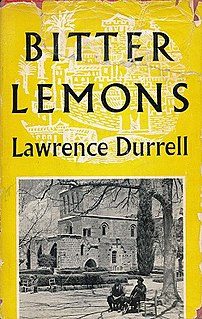 W
WBitter Lemons is an autobiographical work by writer Lawrence Durrell, describing the three years (1953–1956) he spent on the island of Cyprus. The book was awarded the Duff Cooper Prize for 1957, the second year the prize was awarded.
 W
WThe Bridge at Andau is a 1957 nonfiction book by the American author James Michener chronicling the Hungarian Revolution of 1956. Living in Austria in the 1950s, Michener was at the border of Austria and Hungary during the period in which a significant wave of refugees fled Hungary.
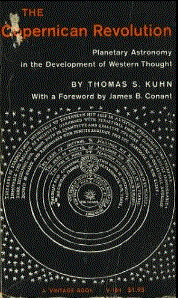 W
WThe Copernican Revolution is a 1957 book by the philosopher Thomas Kuhn, in which the author provides an analysis of the Copernican Revolution, documenting the pre-Ptolemaic understanding through the Ptolemaic system and its variants until the eventual acceptance of the Keplerian system.
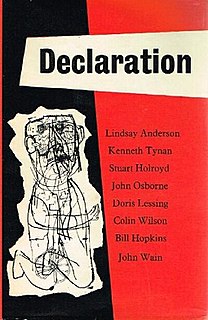 W
WDeclaration is a 1957 anthology of essays by British writers. It was edited by Tom Maschler and published by MacGibbon & Kee. It features short essays by Doris Lessing, Colin Wilson, John Osborne, John Wain, Kenneth Tynan, Bill Hopkins, Lindsay Anderson and Stuart Holroyd. The book is closely associated with the angry young men movement, and the essays are presented as "credos" or manifesto of the writers.
 W
WDialogs on the Atomic Resurrection, the Impossibility Theory, Philosophical Benefits of Cannibalism, Sadness in a Test Tube, Cybernetic Psychoanalysis, Electrical Metempsychosis, Evolutionary Feedbacks, Cybernetic Eschatology, Personalities of Electrical Networks, Perversity of Electrobrains, Eternal Life in a Box, Construction of Geniuses, Epilepsy of Capitalism, Governance Machines, Design of Social Systems — is a collection of philosophical essays by Stanisław Lem.
 W
WThe Diamond Smugglers is a non-fiction work by Ian Fleming that was first published in 1957 in the United Kingdom and in 1958 in the United States. The book is based on two weeks of interviews Fleming undertook with John Collard, a member of the International Diamond Security Organization (IDSO), which was headed by Sir Percy Sillitoe, the ex-chief of MI5 who worked for the diamond company De Beers.
 W
WEmergence from Chaos is a 1957 book by the English writer Stuart Holroyd. In the first part of the book, Holroyd discusses different types of spirituality, while in the second part—roughly two thirds of the book—these distinctions are used to analyse the works of six different poets, each of whom reacted to the issues of modernity with his own spiritual vision. The book was Holroyd's debut and is associated with the phenomenon of the Angry Young Men.
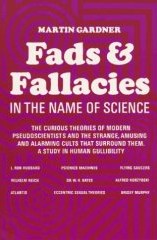 W
WFads and Fallacies in the Name of Science (1957)—originally published in 1952 as In the Name of Science: An Entertaining Survey of the High Priests and Cultists of Science, Past and Present—was Martin Gardner's second book. A survey of what it described as pseudosciences and cult beliefs, it became a founding document in the nascent scientific skepticism movement. Michael Shermer said of it: "Modern skepticism has developed into a science-based movement, beginning with Martin Gardner's 1952 classic".
 W
WThe Fourth Way (1957) is a book about the Fourth Way, a system of self-development as introduced by Greek-Armenian philosopher G.I. Gurdjieff. It is a compilation of the lectures of P. D. Ouspensky at London and New York City between the years 1921 through 1946, published posthumously by his students in 1957.
 W
WGypsy: A Memoir is a 1957 autobiography of renowned striptease artist Gypsy Rose Lee, which inspired the 1959 Broadway musical Gypsy: A Musical Fable. The book tells Lee's true life story in three acts beginning with her early childhood days in theatre when she toured with her sister, June Havoc. The book ends just as Gypsy has gotten on a train and is headed to Hollywood to begin her career in the movies. Her Hollywood career was short lived and she did not get many roles. The roles she did get were so small that at one point she wanted to be billed under her birth name, Louise Hovick.
 W
WA History of the English-Speaking Peoples is a four-volume history of Britain and its former colonies and possessions throughout the world, written by Winston Churchill, covering the period from Caesar's invasions of Britain to the end of the Second Boer War (1902). It was started in 1937 and finally published 1956–58, delayed several times by war and his work on other texts. The volumes have been abridged into a single-volume, concise edition.
 W
WIf This Is a Man is a memoir by Italian Jewish writer Primo Levi, first published in 1947. It describes his arrest as a member of the Italian anti-fascist resistance during the Second World War, and his incarceration in the Auschwitz concentration camp (Monowitz) from February 1944 until the camp was liberated on 27 January 1945.
 W
WThe Life and Work of Sigmund Freud is a biography of Sigmund Freud, the founder of psychoanalysis, by the psychoanalyst Ernest Jones. The most famous and influential biography of Freud, the work was originally published in three volumes by Hogarth Press; a one-volume edition abridged by literary critics Lionel Trilling and Steven Marcus followed in 1961. When first published, The Life and Work of Sigmund Freud was acclaimed, and sales exceeded expectations. Although the biography has retained its status as a classic, Jones has been criticized for presenting an overly favorable image of Freud. Jones has also been criticized for being biased in his treatment of rival psychoanalysts such as Otto Rank and Sándor Ferenczi.
 W
WThe New Class: An Analysis of the Communist System is a political theory book about the concept of the new class by communist Yugoslav figure and intellectual Milovan Đilas. He proposed that the party-state officials formed a class which "uses, enjoys and disposes of nationalised property".
 W
WParapsychology: Frontier Science of the Mind is a book by Joseph Banks Rhine and Joseph Gaither Pratt, originally published in 1957. It is a textbook and reference work which provides an introduction to the field of parapsychology, which discusses "methods for testing, tables for evaluation, reading lists, and other research aids".
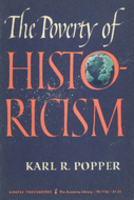 W
WThe Poverty of Historicism is a 1957 book by the philosopher Karl Popper, in which the author argues that the idea of historicism is dangerous and bankrupt.
 W
WRamayana is a retelling of the epic by C. Rajagopalachari. It was first published by Bharatiya Vidya Bhavan in 1957. This book is an abridged English retelling of the Valmiki Ramayana; he had earlier published a version of Kamba Ramayanam. Rajaji considered this book and his Mahabharata to be his greatest service to his countrymen.
 W
WSamurai! is a 1957 autobiographical book by Saburo Sakai co-written with Fred Saito and Martin Caidin. It describes the life and career of Saburō Sakai, the Japanese combat aviator who fought against American fighter pilots in the Pacific Theater of World War II, surviving the war with 64 kills as one of Japan's leading flying aces. Caidin wrote the prose of the book, basing its contents on journalist Fred Saito's extensive interviews with Sakai as well as on Sakai's own memoirs.
 W
WSaving the Appearances: A Study in Idolatry, a book by British philosopher Owen Barfield, is concerned with physics, the evolution of consciousness, pre-history, ancient Greece, ancient Israel, the medieval period, the scientific revolution, Christianity, Romanticism, and much else. The book was Barfield's favorite of those he wrote, and the one that he most wanted to continue to be read.
 W
WScouting 'Round the World is the seminal work on world Scouting, a publication of the World Organization of the Scout Movement, updated every three years, with details on all WOSM member-nation organizations. The equivalent publication of the World Association of Girl Guides and Girl Scouts is Trefoil 'Round the World.
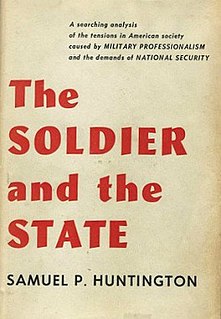 W
WThe Soldier and the State: The Theory and Politics of Civil-Military Relations is a 1957 book written by political scientist Samuel P. Huntington. In the book, Huntington advances the theory of objective civilian control, according to which the optimal means of asserting control over the armed forces is to professionalize them. This is in contrast to subjective control, which involves placing legal and institutional restrictions on the military's autonomy. Edward M. Coffman has written that "[a]nyone seriously interested in American military history has to come to terms with Samuel P. Huntington's The Soldier and the State."
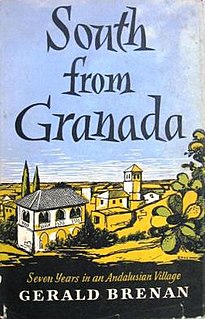 W
WSouth from Granada: Seven Years in an Andalusian Village is an autobiographical book by Gerald Brenan, first published in 1957.
 W
WThe Strangest Secret was a 1956 spoken word record by Earl Nightingale which sold over one million copies and received the first Gold Record for the spoken word, which helped launch the fields of business motivation and audio publishing. It was later adapted into print and video forms.
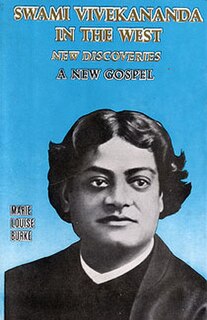 W
WSwami Vivekananda in the West: New Discoveries is a series of biographical books on Swami Vivekananda written by Marie Louise Burke, who is popularly known as Sister Gargi. There are six volumes in the series. This series of books was first published in two volumes in 1957. In 1983-87 these series was republished in six volumes. The book is high acclaimed not just in India but also in the Vedanta circles around the world.
 W
WSyntactic Structures is an influential work in linguistics by American linguist Noam Chomsky, originally published in 1957. It is an elaboration of his teacher's, Zellig Harris's, model of transformational generative grammar. A short monograph of about a hundred pages, Chomsky's presentation is recognized as one of the most significant studies of the 20th century, and in 2011 was selected by Time magazine as one of the 100 most important nonfiction books ever written. It contains the now-famous sentence "Colorless green ideas sleep furiously", which Chomsky offered as an example of a grammatically correct sentence that has no discernible meaning. Thus, Chomsky argued for the independence of syntax from semantics.
 W
WTheory and History: An Interpretation of Social and Economic Evolution is a treatise by Austrian school economist and philosopher Ludwig von Mises. It can be thought of as a continuation in the development of the Misesian system of social science. In particular, it provides further epistemological support for his earlier works, esp. Human Action. Most notably, Mises elaborates on methodological dualism, develops the concept of thymology – a historical branch of the sciences of human action – and presents his critique of Marxist materialism.
 W
WThrough Gates of Splendor is a 1957 best selling book written by Elisabeth Elliot. The book tells the story of Operation Auca, an attempt by five American missionaries – Jim Elliot, Pete Flemming, Ed McCully, Nate Saint, and Roger Youderian – to reach the Huaorani tribe of eastern Ecuador. All five of the men were killed by the tribe. The book is Elliot's first book, and arguably her most well known work.
 W
WThe Untouchables is an autobiographical memoir by Eliot Ness co-written with Oscar Fraley, published in 1957. The book deals with the experiences of Eliot Ness, a federal agent in the Bureau of Prohibition, as he fights crime in Chicago in the late 1920s and early 1930s with the help of a special team of agents handpicked for their incorruptibility, nicknamed The Untouchables.
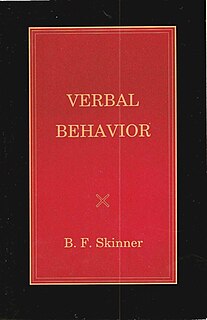 W
WVerbal Behavior is a 1957 book by psychologist B. F. Skinner, in which he describes what he calls verbal behavior, or what was traditionally called linguistics. Skinner's work describes the controlling elements of verbal behavior with terminology invented for the analysis - echoics, mands, tacts, autoclitics and others - as well as carefully defined uses of ordinary terms such as audience.
 W
WVoltaire in Love is a popular history of the sixteen-year relationship between Voltaire and the Émilie, the Marquise du Châtelet. Written by Nancy Mitford and first published in 1957, the book also explores the French Enlightenment. In March 1729 Voltaire was allowed to go back to France. In spite of his love for England, he had become homesick; like many a Frenchman, he could not stand the austerity. In well-to-do houses, according to him, there was no silver on the table; tallow candles were burnt by all but the very rich; the food everywhere was uneatable. The arts of society, the art of pleasing were hardly cultivated and social life very dull compared with that in France. Furthermore, the weather did not suit his "unhappy machine". He often said that his unhappy machine demanded a Southern climate but that "between the countries where one sweats and those where one thinks, he was obliged to choose the latter."
 W
WThe Way of Zen is a 1957 non-fiction book on Zen Buddhism and Eastern philosophy by philosopher and religious scholar Alan Watts. It was a bestseller and played a major role in introducing Buddhism to a mostly young, Western audience.
 W
WA World Restored: Metternich, Castlereagh and the Problems of Peace 1812-1822 is a book by Henry Kissinger that was published in 1957.